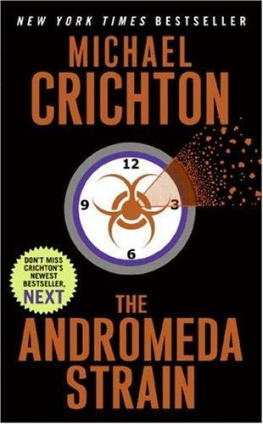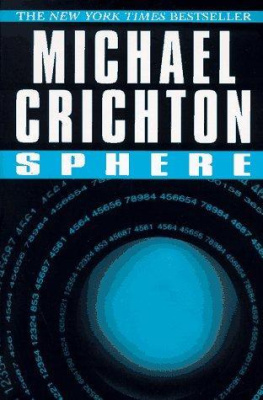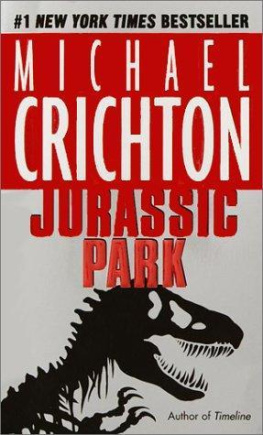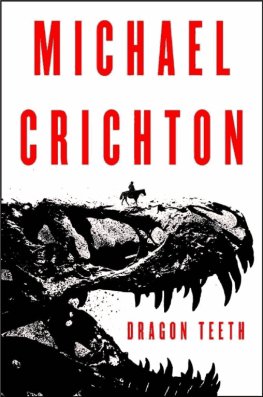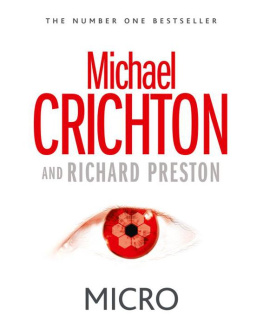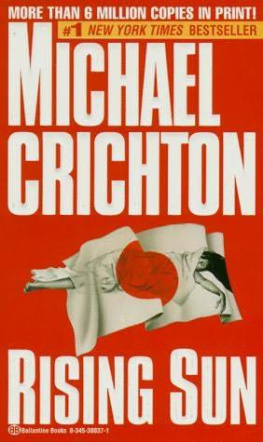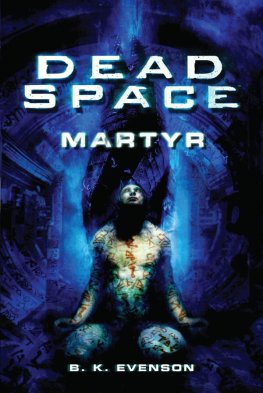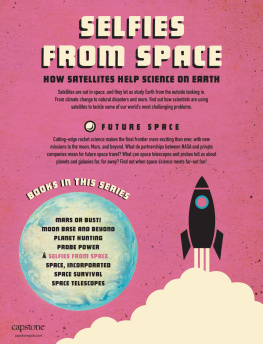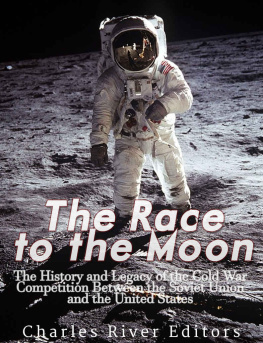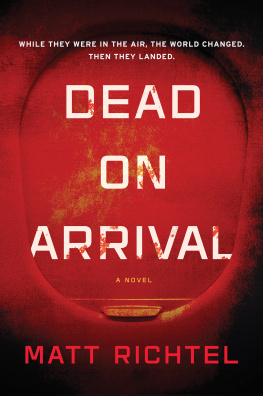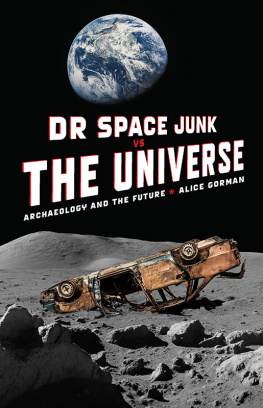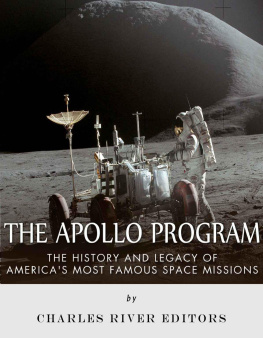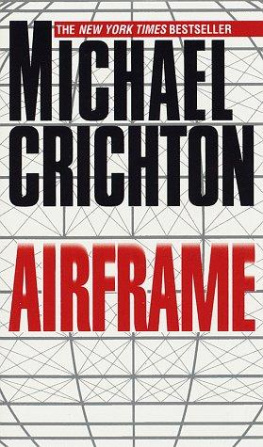THE ANDROMEDA STRAIN
(c) 1969 by Michael Crichton
ISBN: 0-06-170315-X
ISBN: 978-0-06-170315-7
Publisher: Harper
* * * * *
FOREWORD
This book recounts the five-day history of a major American scientific crisis.
As in most crises, the events surrounding the Andromeda Strain were a compound of foresight and foolishness, innocence and ignorance. Nearly everyone involved had moments of great brilliance, and moments of unaccountable stupidity.
It is therefore impossible to write about the events without offending some of the participants.
However, I think it is important that the story be told.
This country supports the largest scientific establishment in the history of mankind. New discoveries are constantly being made, and many of these discoveries have important political or social overtones. In the near future, we can expect more crises on the pattern of Andromeda. Thus I believe it is useful for the public to be made aware of the way in which scientific crises arise, and are dealt with.
In researching and recounting the history of the Andromeda Strain, I received the generous help of many people who felt as I did, and who encouraged me to tell the story accurately and in detail.
My particular thanks must go to Major General Willis A.
Haverford, United States Army; Lieutenant Everett J. Sloane, United States Navy (Ret.); Captain L. S. Waterhouse, United States Air Force (Vandenberg Special Projects Division); Colonel Henley Jackson and Colonel Stanley Friedrich, both of Wright Patterson; and Murray Charles of the Pentagon Press Division.
For their help in elucidating the background of the Wildfire Project, I must thank Roger White, National Aeronautics and Space Administration (Houston MSQ; John Roble, NASA Kennedy Complex 13; Peter J. Mason, NASA Intelligence (Arlington Hall); Dr. Francis Martin, University of California (Berkeley) and the President's Science Advisory Council; Dr. Max Byrd, USIA; Kenneth Vorhees, White House Press Corps; and Professor Jonathan Percy of the University of Chicago (Genetics Department).
For their review of relevant chapters of the manuscript, and for their technical corrections and suggestions, I wish to thank Christian P. Lewis, Goddard Space Flight Center; Herbert Stanch, Avco, Inc.; James P. Baker, Jet Propulsion Laboratory; Carlos N. Sandos, California Institute of Technology; Dr. Brian Stack, University of Michigan; Edgar Blalock, Hudson Institute; Professor Linus Kjelling, the RAND
Corporation; Dr. Eldredge Benson, National Institutes of Health.
Lastly, I wish to thank the participants in the Wildfire Project and the investigation of the -so-called Andromeda Strain. All agreed to see me and, with many, my interviews lasted over a period of days. Furthermore, I was able to draw upon the transcripts of their debriefing, which are stored in Arlington Hall (Substation Seven) and which amounted to more than fifteen thousand pages of typewritten manuscript. This material, stored in twenty volumes, represents the full story of the events at Flatrock, Nevada, as told by each of the participants, and I was thus able to utilize their separate viewpoints in preparing a composite account.
This is a rather technical narrative, centering on complex issues of science. Wherever possible, I have explained the scientific questions, problems, and techniques.
I have avoided the temptation to simplify both the issues and the answers, and if the reader must occasionally struggle through an and passage of technical detail, I apologize.
I have also tried to retain the tension and excitement o events in these five days, for there is an inherent drama in the story of Andromeda, and if it is a chronicle of stupid, deadly blunders, it is also a chronicle of heroism and intelligence.
M.C.
Cambridge, Massachusetts
January 1969
DAY 1
Contact
1. The Country of Lost Borders
A man with binoculars. That is how it began: with a man standing by the side of the road, on a crest overlooking a small Arizona town, on a winter night.
Lieutenant Roger Shawn must have found the binoculars difficult. The metal would be cold, and he would be clumsy in his fir parka and heavy gloves. His breath, hissing out into the moonlit air, would have fogged the lenses. He would be forced to pause to wipe them frequently, using a stubby gloved finger.
He could not have known the futility of this action.
Binoculars were worthless to see into that town and uncover its secrets. He would have been astonished to learn that the men who finally succeeded used instruments a million times more powerful than binoculars.
There is something sad, foolish, and human in the image of Shawn leaning against a boulder, propping his arms on it, and holding the binoculars to his eyes. Though cumbersome, the binoculars would at least feel comfortable and familiar in his hands. It would be one of the last familiar sensations before his death.
We can imagine, and try to reconstruct, what happened from that point on.
Lieutenant Shawn swept over the town slowly and methodically. He could see it was not large, just a half-dozen wooden buildings, set out along a single main street. It was very quiet: no lights, no activity, no sound carried by the gentle wind.
He shifted his attention from the town to the surrounding hills. They were low, dusty, and blunted, with scrubby vegetation and an occasional withered yucca tree crusted in snow. Beyond the hills were more hills, and then the flat expanse of the Mojave Desert, trackless and vast.
The Indians called it the Country of Lost Borders.
Lieutenant Shawn found himself shivering in the wind. It was February, the coldest month, and it was after ten. He walked back up the road toward the Ford Econovan, with the large rotating antenna on top. The motor was idling softly; it was the only sound he could hear. He opened the rear doors and climbed into the back, shutting the doors behind him.
He was enveloped in deep-red light: a night light, so that he would not be blinded when he stepped outside. In the red light the banks of instruments and electronic equipment glowed greenly.
Private Lewis Crane, the electronics technician, was there, also wearing a parka. He was hunched over a map, making calculations with occasional reference to the instruments before him.
Shawn asked Crane if he were certain they had arrived at the place, and Crane confirmed that they had. Both men were tired: they had driven all day from Vandenberg in search of the latest Scoop satellite. Neither knew much about the Scoops, except that they were a series of secret capsules intended to analyze the upper atmosphere and then return.
Shawn and Crane had the job of finding the capsules once they had landed.
In order to facilitate recovery, the satellites were fitted with electronic beepers that began to transmit signals when they came down to an altitude of five miles.
That was why the van had so much radio-directional equipment. In essence, it was performing its own triangulation. In Army parlance it was known as single-unit triangulation, and it was highly effective, though slow. The procedure was simple enough: the van stopped and fixed its position, recording the strength and direction of the radio beam from the satellite. Once this was done, it would be driven in the most likely direction of the satellite for a distance of twenty miles. Then it would stop and take new coordinates. In this way, a series of triangulation points could be mapped, and the van could proceed to the satellite by a zigzag path, stopping every twenty miles to correct any error. The method was slower than using two vans, but it was safer-- the Army felt that two vans in an area might arouse suspicion.
For six hours, the van had been closing on the Scoop satellite. Now they were almost there.
Next page
